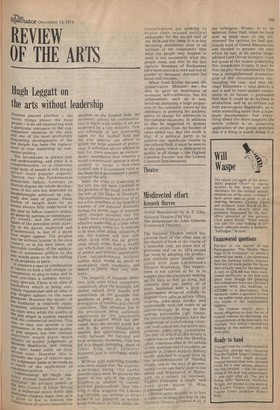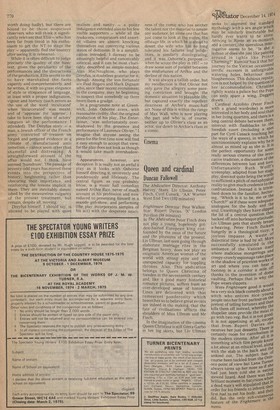Theatre
Misdirected effort
Kenneth Ruffen
Grand Manouevres by A. E. Ellis; National Theatre (Old Vic) The Entertainer by John Osborne (Greenwich Theatre) .
The National Theatre, which has covered most of the other sins in the theatrical book in the course of a miserable year, set some sort of gruesome seal on its 1974 record last week by adopting the production methods more usually associated with Joan Littlewood's Theatre Workshop. The experiment is not carried so far as to suggest that the players are making up the lines as they go along, but certainly they are, nearly all of them, burdened with a style of performance •designed wilfully to disguise their gifts as actors. Often wearing joke-shop masks, and occasionally with ;red noses or as unconvincingly in drag as the average pantomirne Ugly Sisters, the unfortunate company have the assignment of transforming relatively well-conceived characters into tiresome comic-strip caricatures. The play on which all this hoopla is visited has to do with the Dreyfus affair, notorious alike in the annals of anti-semitism and of injustice, an episode in French military history hardly matched in infamy even by the accommodations of Marshal Petain, and in the way of governmental cover-ups fairly close to the ethics and desperation of Watergate.. As a subject for raucously flippant treatment it might well have given pause to Miss I,ittlewood herself. There is some n-ei=stety as to how it came to be done this way by the National Theatre, or indeed at all. If
my colleague, Waspe, is to be believed, Peter Hall, when he took over as head man of the NT, reversed the opinion he had previously held of Grand Manoeuvres and decided to present the play which he had, at an earlier stage, advised Lord Olivier to reject. I can but guess at the reason underlying this remarkable U-turn. It may be that the play first submitted by Ellis was a straightforward dramatisation of the circumstances surrounding the case, and that Michael Blakernore — who directs it and is said to have spoken consistently in its favour — persuaded Hall that it could be so stylised in production, and be so tricked out with extravagant flapdoodle, as to seem something more than a humdrum documentary. Not everything about the show supports the notion (which is an unnerving application of the genial principle that if a thing is worth doing it is worth doing badly), but there are bound to be those suspicious observers who will think it significantly relevant that Ellis — who has been far from timid in his enthusiasm to get the NT to stage the play — apparently fled the country after seeing it in rehearsal.
While it is often difficult to judge precisely the quality of the basic text, given the peculiarity of the performances and the distractions of the production, Ellis seems to me to have marshalled the facts expertly and comprehensively, and he writes, if with no great elegance of style or eloquence of language, at least with a proper indignation, vigour and literacy (such errors as the use of the word 'inculcated' when 'incarcerated' was meant, and of "appraise' for 'apprise', I take to have been slips of actors' tongues at the performance I attended). The Dreyfus story — a man, a Jewish officer of the French army, convicted of treason on forged and perjured evidence in a climate of manufactured an tisemetism — cannot seem other than shameful and distressing. A straightforward account of the affair would not, I think, have seemed 'humdrum'. The passage of seventy-odd years has moved these events into the perspective of history, heightening rather than obscuring their importance, and reinforcing the lessons implicit in them. They are inevitably diminished by the measureless vulgarity of the present treatment, but remain, despite all, moving.
Dreyfus himself, I should say, is allowed to be played with quiet realism and sanity — a polite indulgence extended also to his few visible supporters — while all the traducers, conspirators and assort.: ed villains are almost knocking themselves out conveying various states of dottiness. It is a simplification intended, I daresay to be amusingly helpful and conceivably satirical, and it can be most charitably described as simple-minded. Alan MacNaughton, who plays Dreyfus, is doubtless grateful for it, though. Among the less fortunate are Paul Rogers and Mark Dignam who, since their recent recruitment to the company, may be beginning to suspect that somebody up there bears them a grudge.
In a programme note at Greenwich, John Osborne avers, with reasonable civility, that the original production of his play, The Entertainer, "was unfortunately overshadowed by the presence and performance of Laurence Olivier." I imagine that anyone seeing the piece for the first time now will find it easy enough to accept that view, for the play does not look as though it would take much overshadowing.
Appearances, however, are deceptive. It is really not as awful a play as it looks with Osborne himself directing it, reverently and ponderously and lifelessly. The central figure, as you probably know, is a music hall comedian named Archie Rice, never of much accoant in his profession and now reduced to presenting himself in a seaside girl-show, and performing (the play incorporates samples of his act) with the desperate sauci
ness of the comic who has neither the talent nor the material to amuse any audience, let alone one that has just come to look at the nudes. His, offstage life, in which he is about to desert the wife who has so long tolerated his failures and infidelities, is similarly disintegrating, and it was Osborne's purpose — when he wrote the play in 1957 — to draw some sort of parallel between the misfortunes of Archie and the decline of this nation.
It was always a tallish order, but my recollection is that Olivier not only gave the allegory some passing conviction and brought the domestic situation to plausible life, but captured exactly the repellent, sleaziness of Archie's music-hall' act. None of this is within the range of Max Wall, who is now playing the part and who is, of course, neither up to Olivier's class as an actor, nor down to Archie's class as a comic.





















 Previous page
Previous page